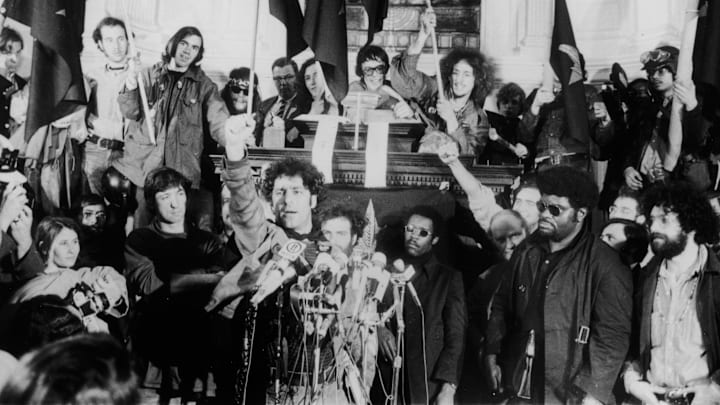Court jester-cum-political revolutionary Abbot “Abbie” Howard Hoffman is one of the most well-known figures of the Flower Power movement. Hoffman—a fierce opponent of the war in Vietnam; a staunch environmentalist; and a firm believer in leftist causes like wealth redistribution, universal health coverage, and ending homelessness—was a bombastic and theatrical figure who often used absurd media stunts to get his points across.
Hoffman has been portrayed by a handful of actors over the years, but none has ever been as fitting as Sacha Baron Cohen—our generation's own bombastic satirist—who took on the role in Aaron Sorkin's The Trial of the Chicago 7, which premiered on Netflix in 2020.
Here are some facts about Abbie Hoffman, who once wore a police uniform underneath a judge’s robe to his very own trial.
- Abbie Hoffman fought his high school teacher for calling him "a Communist punk."
- Abbie Hoffman studied under Abraham Maslow.
- Abbie Hoffman played collegiate tennis.
- Abbie Hoffman is the reason there’s bulletproof glass at the New York Stock Exchange.
- Abbie Hoffman tried to levitate the Pentagon.
- Abbie Hoffman was one of the Chicago Seven.
- Abbie Hoffman wrote a book that was meant to be stolen.
- The FBI file on Abbie Hoffman was 13,262 pages long.
- Abbie Hoffman had a cameo in Born on the Fourth of July.
- Abbie Hoffman and second wife, Anita Kushner, had a son named america.
Abbie Hoffman fought his high school teacher for calling him "a Communist punk."
Hoffman got an early start as a disruptor. In high school, he wrote a paper in favor of atheism, in which he claimed that “God could not possibly exist, for if he did, there wouldn't be any suffering in the world.” His teacher took offense, called Hoffman “a Communist punk,” and Hoffman physically assaulted him, leading to his expulsion from the school.
Abbie Hoffman studied under Abraham Maslow.

Despite his personality being, in his own words, “halfway between the gun factory and the circus,” Hoffman managed to graduate from his next high school and went on to Brandeis University, where he studied psychology under Abraham Maslow, creator of Maslow’s hierarchy of needs. He also studied under Marxist theoretician Herbert Marcuse, whose ideas had a great impact on Hoffman’s politics.
Abbie Hoffman played collegiate tennis.
While at Brandeis, Hoffman was ranked high on the school's tennis team. His coach was Bud Collins, who would go on to become a famous sportscaster, and who joked that the radical Hoffman was conservative on the court.
Abbie Hoffman is the reason there’s bulletproof glass at the New York Stock Exchange.
On August 24, 1967, Hoffman and several other activists infiltrated the New York Stock Exchange to throw money (real and fake) down at the trading floor. It was one of the earliest instances of Hoffman and his cohorts using comedy to make a point. Though the stunt only lasted a few minutes, it got enormous media attention. A few months later, bulletproof glass was installed to, among other things, prevent people from dropping satirical objects on the trading floor.
Abbie Hoffman tried to levitate the Pentagon.

Another one of Hoffman’s eye-catching performance art protests involved poet Allen Ginsberg performing Tibetan chants while Hoffman jokingly attempted to lift the 3,705,793-square-foot home of the Department of Defense into the air.
Abbie Hoffman was one of the Chicago Seven.
After anti-war protests at the 1968 Democratic National Convention in Chicago turned into a police riot, Hoffman and six (originally seven) other activists were charged with conspiracy and traveling across state lines to incite a riot. Hoffman turned the courtroom into a circus, first claiming that presiding judge Julius Hoffman was his illegitimate father, and later donning a judge’s robe in the court and playing tug-of-war with a federal deputy marshal over a National Liberation Front flag.
Abbie Hoffman wrote a book that was meant to be stolen.

In 1971, Hoffman published a manifesto and guide for fighting back against the injustices of a capitalist system. The first section features life hacks for getting food, clothing, and other items for free. The second offers advice on building and maintaining a protest movement, and the third section focuses on specific healthcare, food, and other resource hubs for those living in major cities. Several booksellers refused to carry the book because people were taking the title seriously, and when it became a success, Hoffman joked, “It’s embarrassing when you try to overthrow the government and you wind up on the Best-Seller’s list.”
The FBI file on Abbie Hoffman was 13,262 pages long.
Like many other counterculture and protest figures of the time, the FBI monitored Hoffman extensively—maybe too extensively, considering his personal file was 10 times longer than the entire The Lord of the Rings trilogy.
Abbie Hoffman had a cameo in Born on the Fourth of July.
Hoffman effectively played himself as “Strike Organizer” in Oliver Stone's epic journey through the 1960s. His cameo character speaks at a large antiwar rally attended by Vietnam veteran Ron Kovic (Tom Cruise) which is eventually teargassed by state troopers.
Abbie Hoffman and second wife, Anita Kushner, had a son named america.
To be clear: Their child’s name was america, not America. The lack of capitalization was on purpose. Hoffman went into hiding from the federal government in order to avoid conviction on drug-related charges when america was a toddler, so they started calling the child Alan and arranged ways for him to visit his father without the FBI discovering Hoffman's location. America claimed that one of his babysitters was an FBI agent who went through their trash.
Read More About the Vietnam War:
A version of this story originally ran in 2020; it has been updated for 2025.
